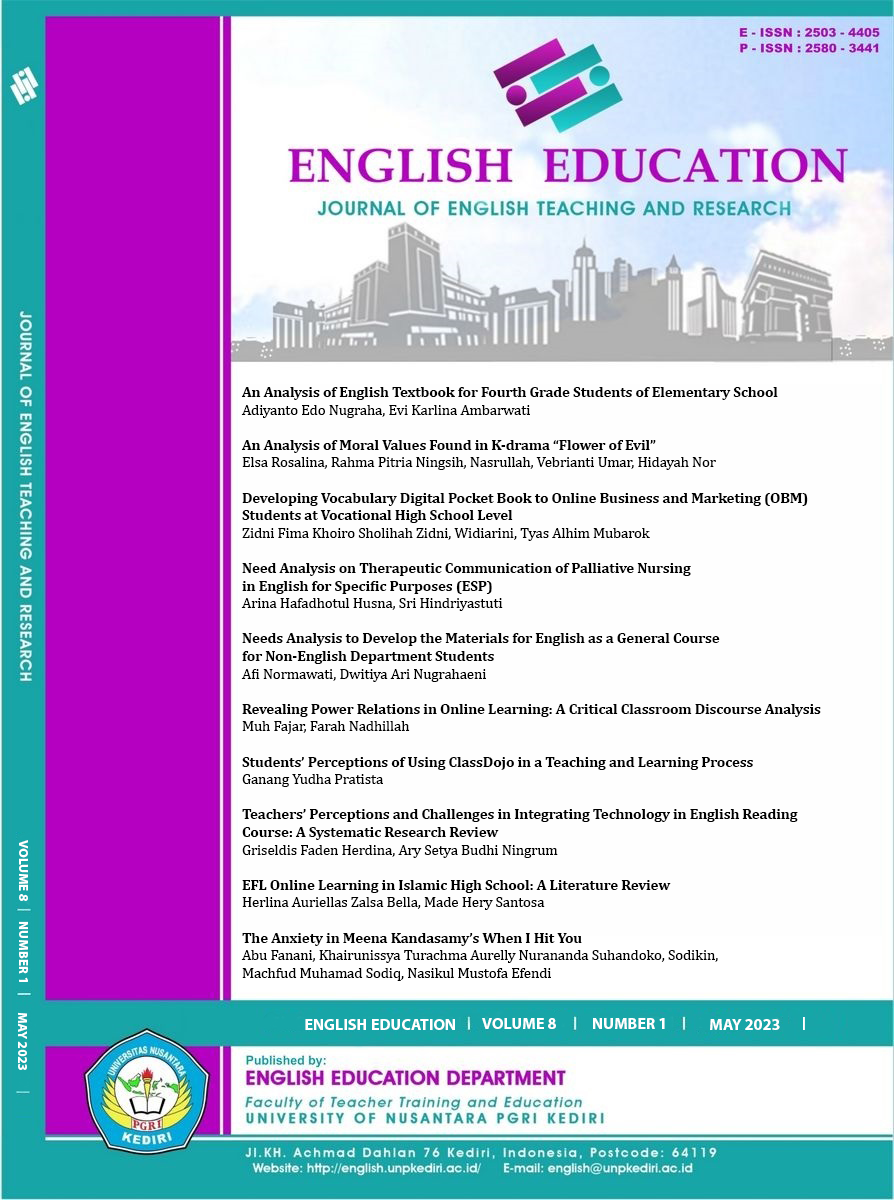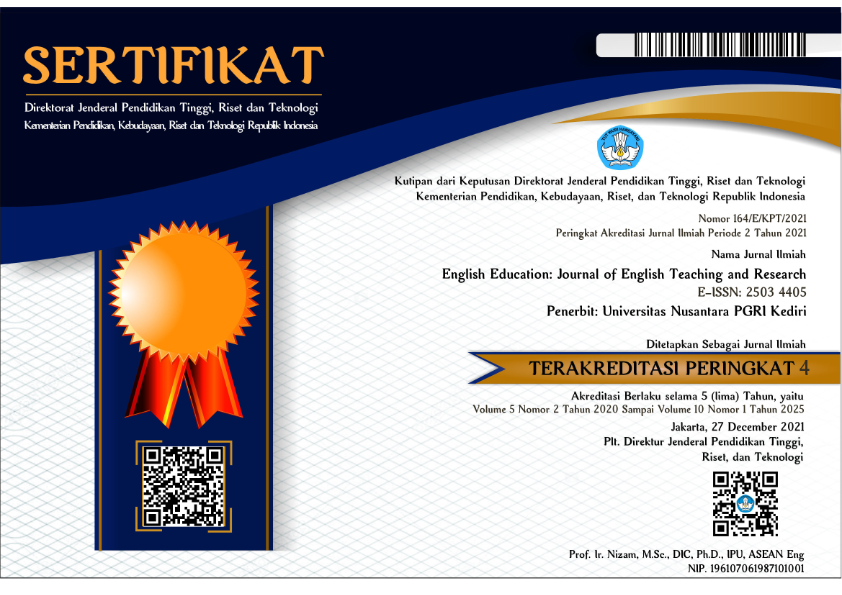Revealing Power Relations in Online Learning: A Critical Classroom Discourse Analysis
DOI:
https://doi.org/10.29407/jetar.v8i1.18422Keywords:
power relations, politeness, online learning, critical classroom discourse analysis, power relation, politeness, online learning, critical classroom discourse analysisAbstract
The Government of Indonesia has made policy by implementing learning with online system through several online platforms since the pandemic covid_19 in 2020. The lecturers and the students of English Department of STKIP PGRI Jombang as unseperated parts of the higher education in Indonesia must realize this policy. Of the reasons, this research will employ qualitative reserach by adopting the theory of politeness and supported by the theory of critical classroom discourse analysis (CCDA), thus, it is aimed at investigating how power relation between the lecturer and the students of English Department of STKIP PGRI Jombang can maintain their good social relations. This research will be conducted to analyze the politeness strategy used by lecturer and students on online learning process. This research will explore what politeness strategy the lecturer apply to the students, what word choice the lecturer use in applying the politeness strategy toward the students and why the lecturer apply the politeness strategy to the students on online learning. The research, furthermore, will relate relate the examination of politeness and critical classroom discourse analysis to get true data analysis of the research. The findings showed that a lecturer maintains good manners to his students so that even though the position of a lecturer is higher, it is different from his students, which has a different role as a consequence. There were three stages of uncovering their power relations. The first stage, this research employed the lecturer’s dominant role to determine the construction of power to his students. It could be described in the analysis of the conversation related to the greetings in the initial of each meeting in online learning and the preparation of group discussion. The second stage, the researcher explored the solidarity expressed the lecturer to his students by employing his personal experiences and his expression of his sorry to hear when there was a student’s father was sick. Those two stages played important roles of exposing their relationship both equal and unequal. The lecturer exercised his power indicated that their social relations are unequal. On the contrary, the solidarity exposed by the lecturer to his students indicated that their social relations are equal.
Downloads
References
Ali Shah, W. (2021). Decolonizing English Language Pedagogy : A Study of Cultural Aspects in English Language Coursebooks and Teachers’ reflections in Pakistan. Kieli, koulutus ja yhteiskunta, 12(6). https://www.kieliverkosto.fi/fi/journals/kieli-koulutus-ja-yhteiskuntajoulukuu-2021/decolonizing-english-language-pedagogy-a-study-of-cultural-aspects-in-englishlanguage-coursebooks-and-teachers-reflections-in-pakistan
Archambault, L., Wetzel, K., Foulger, T. S., & Williams, M. K. (2016). Professional development 2.0.Journal of Digital Learning in Teacher Education, 2974(April), 2153–2974.https://doi.org/10.1080/21532974.2010.10 784651
Bere, A. (2012). A comparative study of student experiences of ubiquitous learning via mobile devices and learner management systems at a South African university. Proceedings of the 14th Annual Conference on World Wide Web Applications.CapePenisula University of Technology, Durban.Retrieved from http://www.zaw3.co.za/index.php/ZAWWW/2012/paper/viewFile/537/160
Brown, P. & Levinson, S. (1987). Politeness: Some universals in language usage. Cambridge: Cambridge University Press.
Holmes, Janet. (2001). An introduction to sociolinguistics. 2nd Edition. Longman.
Kemendikbud. (2020a). Surat Edaran Mendikbud: Pelaksanaan Kebijakan Pendidikan dalam Masa Darurat Penyebaran Corona Virus Disease(COVID-19).
Retrieved from http://kemdikbud.go.id/main/files/download/51e9b72ef92c6d8
Kumaravadivelu, B. (1999). Critical Classroom Discourse Analysis. TESOL Quarterly, Vol. 33, No. 3, Critical Approaches to TESOL. (Autumn, 1999), pp. 453-484. Stable URL: http://links.jstor.org/sici?sici=0039-8322%28199923%2933%3A3%3C453%3ACCDA%3E2.0.CO%3B2-
Litosseliti, Lia. (2010). Research methods in linguistics. London: Continum.
Mohebi, Laila. (2019). Discourse analysis in a virtual classroom: A MOOC example. SSRN Social Science Research Network, Rochester, NY Jun. 6, 2019 Elsevier, B. V., Amsterdam, The Netherlands. June 2019. SSRN Electronic Journal. DOI:10.2139/ssrn.3401161. https://www.researchgate.net/publication/333994592_Discourse_Analysis_in_a_Virtual_Classroom_A_MOOC_Example
Ng, Sik Hung. (1993). Power in language: verbal communication and social influence. London: Sage Publication.
Ramli. Munasprianto. (2020). Classroom Discourse: Teacher Students Interaction And Gender Participation In Primary Science Education. https://journal.uinjkt.ac.id/index.php/psga/issue/view/1088.
van Dijk, T. (2004). Critical discourse analysis. Handbook of Discourse Analysis. Oxford: Blackwell.
Downloads
Published
Issue
Section
License
Authors who publish with this journal agree to the following terms:
- Copyright on any article is retained by the author(s).
- The author grants the journal, the right of first publication with the work simultaneously licensed under a Creative Commons Attribution License that allows others to share the work with an acknowledgment of the work’s authorship and initial publication in this journal.
- Authors are able to enter into separate, additional contractual arrangements for the non-exclusive distribution of the journal’s published version of the work (e.g., post it to an institutional repository or publish it in a book), with an acknowledgment of its initial publication in this journal.
- Authors are permitted and encouraged to post their work online (e.g., in institutional repositories or on their website) prior to and during the submission process, as it can lead to productive exchanges, as well as earlier and greater citation of published work.
- The article and any associated published material is distributed under the Creative Commons Attribution-ShareAlike 4.0 International License








 Article template
Article template



